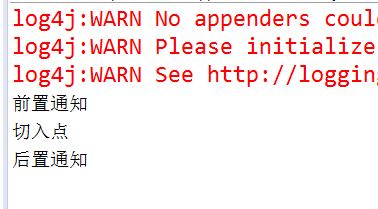spring学习 十 schema-based 前置后后置通知
Posted 阿瞒123
tags:
篇首语:本文由小常识网(cha138.com)小编为大家整理,主要介绍了spring学习 十 schema-based 前置后后置通知相关的知识,希望对你有一定的参考价值。
spring 提供了 2 种 AOP 实现方式:(1)Schema-based ,(2)AspectJ
Schema-based:每个通知都需要实现接口或类,配置 spring 配置文件时在<aop:config>配置
AspectJ:每个通知不需要实现接口或类,配置 spring 配置文件是在<aop:config>的子标签<aop:aspect>中配置
基于Schema-based实现的入门程序
(1)第一步:导入jar包,除了spring中必须的包,下面两个包

(2)第二步:新建通知类
如果要实现前置通知,后置通知,在Schema-based方式中需要实现 MethodBeforeAdvice与 AfterReturningAdvice两个接口,代码如下;
前置通知代码,before方法的参数:
arg0: 切点方法对象 Method 对象
arg1: 切点方法参数
arg2:切点在哪个对象中
import java.lang.reflect.Method; import org.springframework.aop.BeforeAdvice; import org.springframework.aop.MethodBeforeAdvice; public class MyBeforeAdvice implements MethodBeforeAdvice{ @Override public void before(Method arg0, Object[] arg1, Object arg2) throws Throwable { System.out.println("前置通知"); } }
后置通知代码:
afterReturning方法的参数:
arg0: 切点方法返回值
arg1:切点方法对象
arg2:切点方法参数
arg3:切点方法所在类的对象
package com.airplan.pojo; import java.lang.reflect.Method; import org.springframework.aop.AfterReturningAdvice; public class MyAfterAdvice implements AfterReturningAdvice{ @Override public void afterReturning(Object arg0, Method arg1, Object[] arg2, Object arg3) throws Throwable { System.out.println("后置通知"); } }
第三步:aop配置
3.1 引入 aop 命名空间
3.2 配置通知类的<bean>
3.3 配置切面
3.4 * 通配符,匹配任意方法名,任意类名,任意一级包名
3.5 如果希望匹配任意方法参数 (..)
代表把返回值为任意类型,
且在PointCutClass类下面的,参数为任意的方法声明为切点
expression="* execution(void com.airplan.pojo.PointCutClass.*(..))"
下面的配置代表把通知和切入点进行对应
<aop:advisor advice-ref="beforeAdvice" pointcut-ref="mypoint"/>
<aop:advisor advice-ref="afterAdvice" pointcut-ref="mypoint"/>
<?xml version="1.0" encoding="UTF-8"?> <beans xmlns="http://www.springframework.org/schema/beans" xmlns:xsi="http://www.w3.org/2001/XMLSchema-instance" xmlns:aop="http://www.springframework.org/schema/aop" xsi:schemaLocation="http://www.springframework.org/schema/beans http://www.springframework.org/schema/beans/spring-beans.xsd http://www.springframework.org/schema/aop http://www.springframework.org/schema/aop/spring-aop-4.1.xsd "> <!-- 配置通知所在的类 --> <bean id="beforeAdvice" class="com.airplan.pojo.MyBeforeAdvice"></bean> <bean id="afterAdvice" class="com.airplan.pojo.MyAfterAdvice"></bean> <!-- 配置切面 --> <aop:config> <!-- 配置切点 --> <aop:pointcut expression="execution(void com.airplan.pojo.PointCutClass.testFun())" id="mypoint"/> <!-- 配置通知 --> <aop:advisor advice-ref="beforeAdvice" pointcut-ref="mypoint"/> <aop:advisor advice-ref="afterAdvice" pointcut-ref="mypoint"/> </aop:config> <!-- 配置切点所在的类 --> <bean id="pointCutClass" class="com.airplan.pojo.PointCutClass"></bean> </beans>
第四步:测试代码
package com.airplan.test; import org.springframework.context.ApplicationContext; import org.springframework.context.support.ClassPathXmlApplicationContext; import com.airplan.pojo.PointCutClass; public class AopDemo { public static void main(String[] args) { ApplicationContext ac=new ClassPathXmlApplicationContext("applicationContext.xml"); PointCutClass pointCutClass = ac.getBean("pointCutClass",PointCutClass.class); pointCutClass.testFun(); } }
运行结果;

以上是关于spring学习 十 schema-based 前置后后置通知的主要内容,如果未能解决你的问题,请参考以下文章
Spring学习十三----------Spring AOP的基本概念